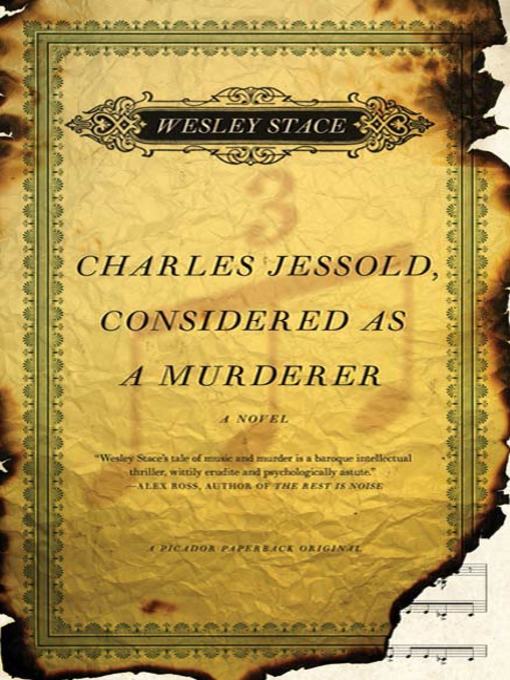
Charles Jessold, Considered as a Murderer
کتاب های مرتبط
- اطلاعات
- نقد و بررسی
- دیدگاه کاربران
نقد و بررسی

December 6, 2010
This intellectually provocative novel from Stace (the pseudonym of musician John Wesley Harding) brings to life the English music world of the first half of the 20th century. Early one June morning in 1923, gifted composer Charles Jessold, after the dress rehearsal of his first opera, Little Musgrave, kills his wife and her lover and commits suicide at his London home. The murders echo the plot of Jessold's years-in-the-making opera as well as the life and work of Carlo Gesualdo, a 16th-century Italian composer. Instead of revolutionalizing English music, Little Musgrave is canceled. Wealthy music critic Leslie Shepherd, who considered himself Jessold's mentor, wrote the opera's libretto, but his frustration over Jessold's procrastination and arrogance led to their estrangement. Twenty-two years later, Shepherd reveals startling new details that put a different, more chilling perspective on the tragedy. Stace (Misfortune) succinctly explores obsession and the relationship between art and life in this satisfying historical. Author tour.

Starred review from January 15, 2011
Nabokovian cunning distinguishes this energetic third novel from the British-born author of well-received historical fiction (by George, 2007, etc.), who leads another artistic life as popular singer-songwriter John Wesley Harding.
An homage to the Russian-American master appears in the figure of the narrator, musicologist-critic Leslie Shepherd, whose fussy mentoring of the eponymous 20th-century composer Charles Jessold echoes the parasitic devotion of narrator Charles Kinbote to elusive genius John Shade, in Nabokov's ineffably intricate novel Pale Fire. Shepherd is likewise a narrator; in fact, he's two of them, as Stace treats us to Shepherd's account, written for the police, of the crime referred to in the novel's title. For Jessold, on the eve of the premiere of his opera Little Musgrave (based on a lurid folk tale), killed his wife and her lover, then took his own life—essentially repeating the notorious act of his near-namesake, Italian Renaissance composer Carlo Gesualdo (a real historical figure). Then, after reporting thus to the proper authorities, Shepherd undertakes a second narrative, revealing What Really Happened. Suspense is cleverly maintained throughout, and a wealth of detail about the 20th-century folk-music revival in England is nicely contrasted with the rise of modernist music, anathema itself to the fastidious Shepherd (a stuffy comic character whom P.G. Wodehouse might have been proud to create). Stace knows all these territories intimately and peppers the narrative with guest appearances by historical composers (e.g., Ralph Vaughan Williams, Arnold Schkenberg), even offering a glimpse of a fictional one: Adrian Leverkuhn, the antihero of Thomas Mann's Doctor Faustus. This yeasty tale can perhaps be faulted for a few too many lame jokes and a surfeit of ostentatious wordplay. But it dances at a sprightly pace, and few readers will regret being told the same tale twice, especially when it's as frisky and entertaining as this one/these two.
Stace's versatility makes this one just about irresistible.
(COPYRIGHT (2011) KIRKUS REVIEWS/NIELSEN BUSINESS MEDIA, INC. ALL RIGHTS RESERVED.)

November 1, 2010
In his other life, novelist Stace (Misfortune; By George) is alt-folk-rock singer John Wesley Hardin. His new work narrates the short life and tragic death of Charles Jessold, an English composer of considerable promise who kills his wife and her lover and commits suicide on the night before the premiere of his folk opera, Little Musgrave. Because the opera's plot parallels too closely the sensational deaths, it never opens. The story is told three times over, first in a news release; then with a sanitized narrative prepared by Jessold's champion and collaborator, a gentleman critic named Leslie Shepherd; and finally, in Shepherd's bald retelling of events years later. The narrative is like a set of Chinese boxes, or perhaps an Agatha Christie novel: open one box and another still waits to be opened and contains a very different story. A virtue of this highly enjoyable diversion is Stace's sensitivity to tone: he captures the way aesthetes wrote and talked in the giddy early 1920s, when feyness and wit were all. VERDICT This clever, entertaining novel will appeal to music and opera buffs and literary-historical fiction fans. [Jessold's killings parallel the 16th-century composer Carlo Gesualdo's murder of his wife and her lover.--Ed.]--David Keymer, Modesto, CA
Copyright 2010 Library Journal, LLC Used with permission.

February 15, 2011
Writing music is murder in novelist and musician Staces thriller set in 1920s Great Britain. As the novel opens, the premiere of gifted young composer Charles Jessolds new opera, Little Musgrave, is upstaged, in the deadliest of ways, when Jessold kills his wife and her lover, then takes his own life. More shocking still: the composers brutal crimes are strikingly similar to those portrayed in his new work. Narrated by a respected music critic, Leslie Shepherd, Staces latest offering recounts the years leading up to Jessolds crime, as Shepherd relishes (and occasionally dreads) his role as the composers collaborator and friend. What was it that pushed Jessold over the edge? Was he having an affair with Shepherds lovely wife, or was the pairs relationship simply one of artist and muse? Stace (By George, 2007) starts with a bang (literally), but the tale loses some momentum as Shepherd belabors the details of his own life. Still, music-history fans will enjoy Staces take on the emergence of modernism in concert venues across prewar Europe.(Reprinted with permission of Booklist, copyright 2011, American Library Association.)

























دیدگاه کاربران